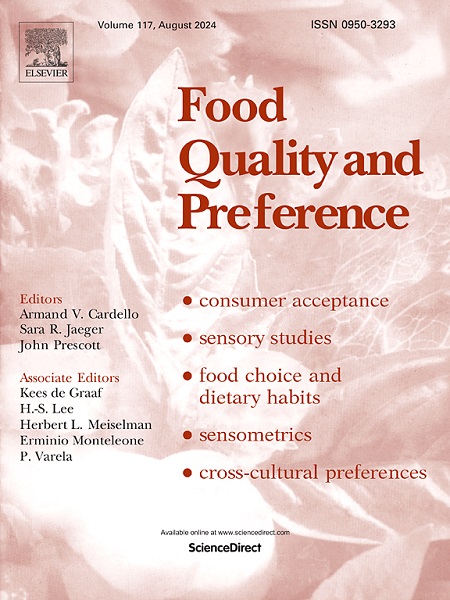Norwegian consumption of plant-based meat analogues
IF 4.9
1区 农林科学
Q1 FOOD SCIENCE & TECHNOLOGY
引用次数: 0
Abstract
Plant-based meat analogues (PBMA) are expected to reduce environmental, health, and animal welfare challenges from the production and consumption of meat. This paper investigates PBMA consumption using three rounds of a survey. PBMA consumption in Norway increased from 2017 to 2019 but stagnated in 2022. Several food choice motives and socioeconomic factors affected consumption consistently across the survey rounds. Emphasizing the environment, animal welfare, and novelty were positively associated with PBMA consumption, while emphasizing familiarity and Norwegian origin were negatively associated. Younger, higher educated, urban, and vegetarian respondents were more likely to consume PBMA. Use of social media had a positive effect on the consumption for the total sample, but it was not stable across the survey rounds. Producers, marketers, and other policy makers could promote the environmental and animal welfare benefits along with the novelty aspects of PBMA. The use of domestic ingredients could also appeal to older and rural individuals who emphasize food familiarity.
挪威对植物性肉类类似物的消费
植物性肉类类似物(PBMA)有望减少肉类生产和消费对环境、健康和动物福利的挑战。本文通过三轮调查来调查PBMA的消费情况。挪威的PBMA消费量从2017年到2019年有所增加,但在2022年停滞不前。几个食物选择动机和社会经济因素在调查过程中始终影响着消费。强调环境、动物福利和新颖性与PBMA消费呈正相关,而强调熟悉度和挪威原产地负相关。年轻、受过高等教育、城市和素食的受访者更有可能消费PBMA。社交媒体的使用对总样本的消费有积极的影响,但在整个调查轮次中并不稳定。生产者、营销商和其他政策制定者可以促进环境和动物福利的好处,以及PBMA的新颖性。使用国产食材也可能吸引注重熟悉食物的老年人和农村人。
本文章由计算机程序翻译,如有差异,请以英文原文为准。
求助全文
约1分钟内获得全文
求助全文
来源期刊

Food Quality and Preference
工程技术-食品科技
CiteScore
10.40
自引率
15.10%
发文量
263
审稿时长
38 days
期刊介绍:
Food Quality and Preference is a journal devoted to sensory, consumer and behavioural research in food and non-food products. It publishes original research, critical reviews, and short communications in sensory and consumer science, and sensometrics. In addition, the journal publishes special invited issues on important timely topics and from relevant conferences. These are aimed at bridging the gap between research and application, bringing together authors and readers in consumer and market research, sensory science, sensometrics and sensory evaluation, nutrition and food choice, as well as food research, product development and sensory quality assurance. Submissions to Food Quality and Preference are limited to papers that include some form of human measurement; papers that are limited to physical/chemical measures or the routine application of sensory, consumer or econometric analysis will not be considered unless they specifically make a novel scientific contribution in line with the journal''s coverage as outlined below.
 求助内容:
求助内容: 应助结果提醒方式:
应助结果提醒方式:


